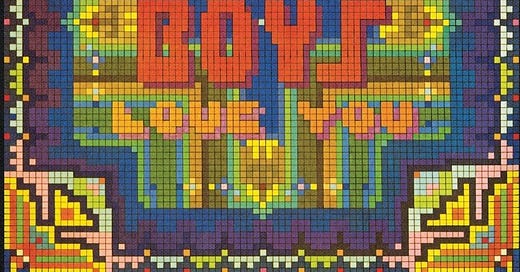Happy 45th Anniversary to When Brian Wilson Kinda Invented Synth-Pop on 'The Beach Boys Love You'
The 1977 album was Brian's first full return to writing and producing since 'Pet Sounds.'
If you are a regular peruser of Check This Out!, you know that I have a slight (okay, inoperable) obsession with The Beach Boys’ post-Pet Sounds output and the mixed bag of material they released throughout the 70s. (Read my deep dive into Sunflower here or revisit my review for last summer’s Feel Flows boxset).
I realize that this isn’t everyone’s cup of tea. Still, I can’t pass up opportunities to suggest that my readers should revisit an album that didn’t sit right with them, or let’s be honest, you probably didn’t even know it existed - which brings us to The Beach Boys Love You, released 45 years ago this week.
In 1977, The Beach Boys were already a decade out from their commercial heyday, with substance abuse and inner band conflict pushing them in different directions. None were in such a precarious position as Brian Wilson, who was deep in a battle with mental health and substance abuse.
Mostly absent from the band’s tours since the mid-60s, Wilson’s last dedicated studio effort for the group was the Smile sessions, which their label rejected before The Beach Boys re-recorded a lofi version in Wilson’s makeshift home studio, releasing it as Smiley Smile. The group tried to fill in these giant gaps during this period by adding Blondie Chapman and Ricky Fataar, who, in all fairness, do an underrated job on Holland and Carl and the Passions - “So Tough.” The Beach Boys commercial state was so dire at this point that the label included Pet Sounds with the Carl and the Passions vinyl to boost sales (some audiophiles say this is surprisingly the best pressing of Pet Sounds).
Wilson appeared sporadically during these years but often was holed up in his Bel-Air mansion doing a copious amount of drugs. There’s a lot of mythical build-up around this time. Stories of Brian Wilson asking to meet John Lennon, even if he had hung out with him multiple times, including a rumored LSD session. Or the time when he met Elvis Presley in his studio and nervously tried to karate chop The King.
In 1975, after the surprise success of the greatest hits compilation Endless Summer, the group was keen to capitalize on the returned buzz, and Brian once again toured with the band. This led to 15 Big Ones, a record that has its moments but is primarily a turd of a covers-heavy record, but is notable here as Wilson produced the uneven effort.
In the fall of 1976, Wilson wrote and recorded almost all of what would become The Beach Boys Love You, originally intended to be a solo album called Brian Loves You. Not wanting to deal with the band politics of sailing his own course, Wilson included the rest of the group to lend vocals, satisfying Warner Bros., who the band owed more Beach Boys records.
For those expecting another Pet Sounds, there’s sure to be a disappointment, as Love You musically is full of synthesizers, found at the time in prog-rock epics but were most certainly not a factor in AM pop music. It’s understandable why this made the record decisive amongst fans upon its release, as there are harsh Moog bass riffs throughout the album. And speaking of harsh, Wilson’s vocals are absolutely fried from years of cigarettes and cocaine use. Still, his voice remains an enigma on the record - often singing off-key, Wilson could still hit his otherworldly falsetto, as demonstrated in this performance of “Good Vibrations” when Lorne Michaels asked him to appear solo on Saturday Night Live while the rest of the band played a sold-out show at Madison Square Garden.
Another criticism also lofted at Loves You is the subject of the lyrics, which are strange and often childlike. In songs like “Roller Skating Child,” it is pretty creepy to hear a beat-up guy in his thirties sing, “And we’ll make sweet lovin’ when the sun goes down, we’ll even do more when more when your mama’s not around.” Wilson has since said a lot of the adolescent themes are what he thought fans wanted from The Beach Boys, who found their fame during their teenage years. Brian Wilson biographer Tim White called the record a "portrait of a man trying to redefine his shattered personality."
Four and a half decades after the release of Love You, I think it’s vital to look at this record with the progress we’ve made in understanding the complexities of mental health. For all of the talk of Wilson’s genius, his heavy substance abuse often makes him the butt of the joke. But it’s worth recognizing that with his diagnosed schizoaffective disorder and manic depression, Brian Wilson’s path is an arduous one, with or without the use of psychedelics.
Instead of “the weird synthesizer one,” Love You should be viewed as a celebration of a human overcoming their darkest time and once again expressing themselves again in such an essential fashion. While reading through old reviews for this piece, no one understood this more at the moment than Patti Smith (surprise, surprise. Always a badass, that Patti). Speaking as a New York punk who previously didn’t want to have anything to do with The Beach Boys, she says:
“love you is siphoned from the meandering mind of a madman. like the hero-dreamer of slaughterhouse five we have a case of where existence is elsewhere. for the hero, it lies in the future, but for brian wilson the dream is trapped within the wholesome abstraction of a jello ad. his desire to escape into the real world.”
This idea makes that much more sense when listening to the stream of consciousness of “Solar System,” which finds Wilson singing, “If Mars had life on it, I might find my wife on it,” or possibly envisioning himself as the host of The Tonight Show on the song “Johnny Carson.” It makes sense once again when “Ding Dang” comes on, a warped fifty-seven-second jingle that Wilson wrote with The Byrds’ Roger McGuinn while high on amphetamines - it could very well feature as a parody commercial on Tim & Eric Awesome Show, Great Job!.
These years are a time in Wilson’s life that found him personally isolated and with a bloated payroll of hangers-on, including his first bout with the infamous Dr. Eugene Landy, who leeched on to The Beach Boys payroll while often making Wilson’s mental health situation much worse. Wilson has since said that some of these songs were co-written with Landy, but Brian Wilson is an unreliable narrator. The voices in Wilson’s head are forever a part of him, as he often still cancels shows, even after decades of sobriety.
While all of the songs are written and recorded by Wilson, it’s worth noting that Love You is also full of solid outings from the rest of the band, especially brothers Carl (who co-produced) and Dennis, with the latter in his peak vocal era on “Mona” and “I’ll Bet He’s Nice.” Al Jardine lends an enjoyable performance on the record’s lone single, “Honkin’ Down the Highway.” The most attractive part of this album may also be that Mike Love is barely on it minus a few features and background work, with “Airplane” being an excellent showing for the group’s most obnoxious and outspoken member. Wilson’s first wife Marilyn also shows up for the lovely duet in “Let’s Put Our Hearts Together” and it’s no wonder their daughters Carnie and Wendy would go on to form Wilson Philips after hearing it.
Love You is special because it’s somewhat of a one-off with Brian Wilson giving his everything after a decade-plus of floating aimlessly while battling mental illness. He wouldn’t entirely write and produce another record until his self-titled debut in 1988. To this day, Wilson still considers it his favorite album he’s worked on, and sometimes, I agree.
So give The Beach Boys Love You a listen, as it’s an oddity in a discography of a band who never shied away from weirdness. Call it synthpop, new wave, punk, or whatever you want, it’s a record unlike anything else from its time.
If you enjoy this feature, why not subscribe to Check This Out!? You’ll receive fresh tunes in your inbox twice weekly. Rad!







